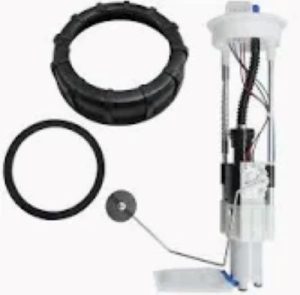Often, fuel pump noise is an early sign of potential issues. When a fuel pump is operating properly it makes a quiet humming noise you can barely hear unless you're listening for it. If the noises that come out of the pump are different from how it started making a whine or buzz, this could indicate trouble within the fuel system. A loud whining noise, for instance, can indicate the fuel pump is having difficulty maintaining a sufficient pressure at say 40 – 60 PSI (pounds per square inch). Should the pressure fall out of this range, the engine may hesitate, run poorly or even die as it is not getting enough fuel to correctly combust.
The most common cause of fuel pump noise is a dirty fuel filter. If that filter gets clogged (and what engine doesn't dump a whole lot of mess into the fuel tank), the pump has to work harder to provide enough flow, and noise goes up. When the fuel pump is working too hard, it dies much more quickly, so replace the filter which usually runs between $50 to $100 and you can get as many as three additional years out of your expensive pump. Running the vehicle with a clogged filter can have as much as 20% of a reduction in efficiency on most pumps and premature failure.

Fuel level — Running the car with low fuel can cause an unusual sound coming from the fuel pump. The pump performs better when there is some fuel inside the tank which acts as a coolant for it. If the tank is continually low, the pump will be more likely to overheat causing noisy operation and a reduced life time. A fuel pump typically is designed to last between 100,000 and 150,000 miles but repeated time spent overheating will cut this in half and warrant that early exchange. On the fuel side, always leave a quarter tank of fuel to save your pump from unnecessary wear and tear.
Depending on location and the grade of fuel used, you could be hearing noise from fuel contamination. When water or debris manages to find its way inside the fuel system, it can cause such abnormal grinding noise or sputtering sounds of the pump's internals. One of the biggest vehicle recalls since wide-spread fuel pump exhausts in 2020 was documented in over 150,000 autos with fuel contamination problems. This can be prevented by always going to good stations and changing the filter every so often.
The third thing that can cause fuel pump noise are electrical problems. In this case, the pump will be supplied with an unstable voltage (below the normal 12V) and it will behave unstably too producing noise changes. This can cause a reduced performance and noise in the fuel pump by up to 15 percent due to fluctuating voltage related issues like faulty wiring or bad fuel pump relay.
Read more about fuel pump problems at Fuel Pump.
